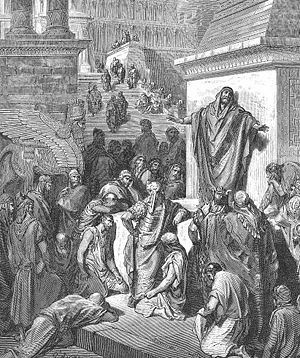To begin, the editors note how many since the rise of modern liberalism and biblical criticism have enjoyed picking on Jonah arguing that it is simply a fable or a myth rejecting its historicity. The reasons for this should be obvious on the surface. For one, fish don't swallow people only to vomit them up again. Likewise, plants don't grow and then be eaten by a small worm in a matter of minutes or hours. The problem with such arguments is to assume that the God of creation has no control over His creation. If God is supernatural and not bound by natural laws, then it is logical to conclude that He can override natural laws in a supernatural way. Jonah is no exception.
The dictionary writes:
Many since the 19th Century AD have regarded Jonah as a parable or didactic fiction, as if factual history were ruled out by literary artistry or the recounting of miraculous events. If this narrative, however, whose form bears at every point the mark of a historical account, was judged unhistorical on either of these bases, then most of the Bible would follow easily along. It is pointless to ask whether Jonah really could have been swallowed by a great fish without also asking whether God really could communicate with a prophet. Every aspect of man’s encounter with God is miraculous. Jonah is clearly didactic, but it is not presented as fiction or interpreted as such by Jesus (cp. Matt. 12:40-41). -942
Also, the entry discusses why Jonah was so adamant to not preach repentance to the Ninehvites. This is helpful because oftentimes we read Jonah without realizing the difficulty of the task Jonah was asked to complete. Would we go to the inner circle of the most wicked terrorist and proclaim the gospel to them? I am willing to bet we wouldn't simply because we would think that they wouldn't deserve the good news.
Jonah was not pleased when God commanded him to go to Nineveh and preach repentance. The Assyrians worshiped the vicious god Ashur and a multitude of other gods and goddesses. Assyrian brutality and cruelty were legendary. The Assyrians were known to impale their enemies on stakes in front of their towns and hang their heads from trees in the king’s gardens. They also tortured their captives – men, women, or children – by hacking off noses, ears, or fingers, gouging out their eyes, or tearing off their lips and hands. They reportedly covered the city wall with the skins of their victims. Rebellious subjects would be massacred by the hundreds, sometimes burned at the stake. Then their skulls would be placed in great piles by the roadside as a warning to others. Jonah decided that he would rather quit the prophetic ministry than preach to such people. Nineveh was about 500 miles to the east, so he headed for Tarshish, probably what is now Spain, the farthest western location he knew, about 2,000 miles. -945
* The above picture is of Jonah preaching in Nineveh.





No comments:
Post a Comment